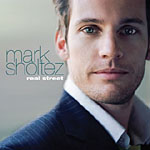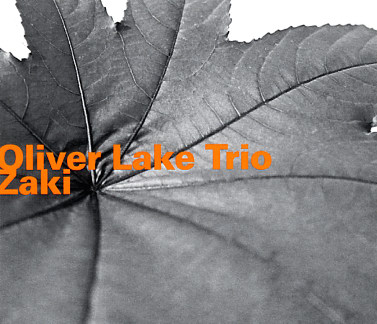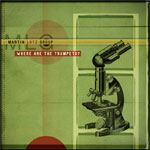Home » Jazz Articles » Interview » Mark Sholtez: True to Himself
Mark Sholtez: True to Himself
I always try to write about things that are true to me. The songs aren't necessarily autobiographical, but they will at least start with something that has happened to me or that I'm feeling
 It's been more than a year now since Mark Sholtez's debut album Real Street (Verve, 2006) was released. Exciting things have happened since, mainly in his home country of Australia. Real Street celebrated ten weeks in a row at the number one position on the Jazz and Blues Album Charts, and was also nominated for the Aria Awards in the category of Best Jazz Album. To bring things somewhat full circle, Sholtez then proudly accepted the 2007 APRA Music Award for Most Performed Jazz Work.
It's been more than a year now since Mark Sholtez's debut album Real Street (Verve, 2006) was released. Exciting things have happened since, mainly in his home country of Australia. Real Street celebrated ten weeks in a row at the number one position on the Jazz and Blues Album Charts, and was also nominated for the Aria Awards in the category of Best Jazz Album. To bring things somewhat full circle, Sholtez then proudly accepted the 2007 APRA Music Award for Most Performed Jazz Work.
Sholtez is more than happy to look back on an exhilarating period of his life, in which his career got a well- deserved turbo boost. Let's face it, not every aspiring artist out there is given the opportunity to sign with Verve Records and record with some of the finest jazz musicians available in less than a week. Because that's what it took for a tape with rough mixes to end up on chairman Tommy LiPuma's desk, resulting in a long distance phone call to Brisbane, Australia.
"Before signing a record deal and recording Real Street, I had always looked at that as the ultimate goal," explains Sholtez. "When you're trying to make a living working the clubs and writing and recording in your spare time, to get it all to come together can seem like such an unlikely reality at times. For me, that's what made it hard to think too far beyond that.
"The biggest change for me, once Real Street was actually released, was the realization that I had, in fact, just arrived at the beginning of my music career. After more than ten years of working hard to get it together I was finally standing on the starting line.
"Now, as I get ready to go into the studio to record a new album, it's interesting to look back on the past year or so and think about all the cool things I've gotten to do. Like playing the Sydney Opera House opening for Diana Krall and touring with George Benson and Al Jarreau. And also, it was very cool meeting people that have made a genuine connection to the songs on Real Street. It's a treat when you're meeting people after a show and someone tells you that they recently got married and they used one of your songs as their bridal waltz; or they walked down the aisle to one of your songs or something like that. I had one guy tell me that he proposed to his girlfriend at one of my shows!
"I'm at the point now," Sholtez concludes, "where I'm closing the book on Real Street and focusing on the new songs and the new recording. To know the first album has a life of its own now and will continue to play a part in someone's life somewhere is exciting. It motivates me to want to make more music."

There's a huge difference in recording an album and performing live, that's why not all recording artists are comfortable onstage. Studio perfection can easily hide what can go wrong in a live performance; artistic and technical standards often aren't an issue in a studio environment, while the real-time situation onstage demands more from a musician than just to play an instrument and/or sing.
The skill of entertainment has become a discipline in its own right. Recorded music doesn't necessarily require a band to play their parts together. Onstage, musicians really need to be able to rely on their colleagues to deliver the goods as a collective, so the audience will be content. And this is just looking from the gloomy side. In Sholtez's case, it wasn't so much the pressure of living up to the quality recording of his debut album (a stellar cast of musicians, vibrant arrangements of original material) as it was to continue as a performer who happened to have been the first Australian artist to sign with the prestigious Verve label.
Does Sholtez work with a steady band, or different musicians? What are his ambitions and dreams in this direction, about playing his music live? What qualities should a musician have, to make a great live performance? And does Sholtez like to play his songs the way they were recorded, or is there room for improvisation?
"Whenever I go to see a band or an artist live," Sholtez says, "I'm always hoping to hear something new, that you won't be listening to the album or get to watch a music video. Different arrangements or stories about what inspired the songs, or even some quirky cover that sheds some light on what the artist is listening to themselves. When I perform, I try to stay true to that. I think it's really important to let the audience get to know you. Like how they get to see me on stage isn't too different from hanging out with me at home, for example.
"I have a fairly regular live band and all the guys are great players," concludes Sholtez, "so I also like to give them the opportunity to showcase their musicianship. I've never been into just playing the music exactly the same as it is on the album. The songs act like a road map, and you can drive it however you like. It's negotiable, as far as I'm concerned. The discoveries you make when you are improvising are always the best ones. There's no point in having a great band if you don't give them the freedom to play."
YouTube has some clips of Sholtez in concert, and they offer a little insight in what Sholtez and band are capable of. His singing is more loose and freewheeling than on the album, and the band is right there with him.
All About Jazz: So now that you are closing the book on Real Street, what can your audience expect next? And can you tell us something about the process of songwriting?
Mark Sholtez: My main focus at the moment is getting back into the studio for album number two. I have written about thirty new tunes already, so there is plenty to choose from. One of my favorite things in the world is the feeling you get when you've just finished writing a new song. When I started writing I would always write sitting at the piano, but over the past few years I have written almost entirely on guitar. I taught myself to play guitar purely for the purpose of being able to be mobile with the songwriting. It was always such a frustration to not be able to work unless you happened to be in the same room as a piano and with all the traveling you need to do, playing music, it just made sense to me to buy a guitar. Now interestingly enough I rarely play piano, even live, and I'm seldom without a guitar in my hands.

I will occasionally co-write but most of the time it's just me.
I always try to write about things that are true to me. The songs aren't necessarily autobiographical, but they will at least start with something that has happened to me or some other thing that I'm feeling. I can build it up from there with as little or as much poetic license as I choose, but at the heart it will always connect back to me in some way. There will always be an element of truth in there somewhere.
AAJ: You've also toured in Asia. Can you tell us something about those experiences, what strikes you the most when thinking about it? And what's Australia like—you're from Brisbane—what's the music and jazz scene like in Brisbane?
MS: I've been lucky in the fact that music has taken me to a lot of interesting places. Before I signed my record deal, I spent six months living in Japan and playing there, which was fantastic. I have also spent a bit of time in the U.S.A. including Nashville, where I first saw the business of songwriting in action. I worked with some writers there that write every day, from Monday to Saturday, 9 to 5. That kind of discipline is amazing and it's no wonder there are so many great songwriters in Nashville.
Where I live in Brisbane, there's a small scene but there are some great musicians. The problem with a small city though is we lose a lot of really talented players to Sydney and Melbourne. In turn, the guys at the top of the food chain in those cities are looking to places like New York or Europe to try their luck.
One of the things I really do like about Brisbane is that all the bands are doing their own thing and it's all different and interesting. You don't get a whole lot of the same kind of bands all pushing to play in the same venues. Brisbane is becoming a bit of a hot spot for original music and it's also a great city to live in. I'm less than one hour away from some of the greatest beaches in the world and it's not unusual for a winter day to be 25 degrees Celsius.
AAJ: What musicians were of influence to you when growing up, what music did you like to listen to and what musicians would you like to work with?
MS: I listen to a lot of very different music. From AC/DC to [John] Coltrane. All of it has influenced me in some way or another. I was lucky that my parents played me some great music when I was a kid. Those records seem to be coming out more and more in the things I'm doing now. One of my favorite onstage moments from this year was opening for George Benson. The first record I can remember dad ever playing me when I was little was Benson's Breezin' (Warner Bros., 1976). I had George meet my dad backstage before the show and got that LP autographed for him. When I walked on stage I said, "Almost thirty years ago my dad introduced me to the music of George Benson and tonight I got to introduce my dad to George Benson." That felt pretty cool for me.

As far as who I'd like to work with, I had always thought I would like to record with producer Tommy LiPuma. I got to do that on my very first album, so I have been pretty spoiled already. In fact, so many of the guys who played on my record were on my list of people I would be happy just to meet, let alone actually record with.
AAJ: And for the Dutch readers, can you tell us something about your Dutch ancestry? Do you know anything about the Netherlands?
MS: I don't know a huge amount about the Netherlands apart from basic history, and knowing that they have a pretty happening music scene. My father and his family moved to Australia when my dad was about four or five years old. Both my Dutch grandparents have passed away, and dad was so young when they immigrated that so much has been forgotten. As I get older, I am becoming more and more interested in it, so I recently applied for a Dutch passport, which I now have. I'm looking forward to getting the opportunity to spend some extended time there and make that important connection. I would really love to take some time out and live there for a year or so.
AAJ: Goals for the future: to tour in other parts of the world? Record more albums?
MS: I'm having such a great time doing what I'm doing; I just hope I can stay on the ride. If I'm looking back on the second album, eighteen months from now, knowing that I've seen more of the world, played another year of exciting shows and that I'm about to go into the studio for a third album, what more could I ask for?
Selected Discography
Mark Sholtez, Real Street (Verve, 2006)
Photo Credit
Courtesy of Mark Sholtez
Tags
PREVIOUS / NEXT
Support All About Jazz
 All About Jazz has been a pillar of jazz since 1995, championing it as an art form and, more importantly, supporting the musicians who make it. Our enduring commitment has made "AAJ" one of the most culturally important websites of its kind, read by hundreds of thousands of fans, musicians and industry figures every month.
All About Jazz has been a pillar of jazz since 1995, championing it as an art form and, more importantly, supporting the musicians who make it. Our enduring commitment has made "AAJ" one of the most culturally important websites of its kind, read by hundreds of thousands of fans, musicians and industry figures every month.






















